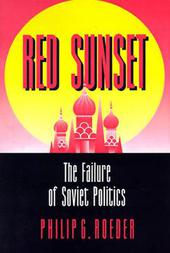
|
Red Sunset: The Failure of Soviet Politics
Paperback / softback
Main Details
| Title |
Red Sunset: The Failure of Soviet Politics
|
| Authors and Contributors |
By (author) Philip G. Roeder
|
| Physical Properties |
| Format:Paperback / softback | | Pages:336 | | Dimensions(mm): Height 254,Width 197 |
|
| ISBN/Barcode |
9780691019420
|
| Classifications | Dewey:320.947 |
|---|
| Audience | | Professional & Vocational | | Tertiary Education (US: College) | |
|---|
| Illustrations |
18 line illus.
|
|
Publishing Details |
| Publisher |
Princeton University Press
|
| Imprint |
Princeton University Press
|
| Publication Date |
10 October 1993 |
| Publication Country |
United States
|
Description
Why did the Soviet system fail? How is it that a political order, born of revolution, perished from stagnation? What caused a seemingly stable polity to collapse? Philip Roeder finds the answer to these questions in the Bolshevik "constitution"--the fundamental rules of the Soviet system that evolved from revolutionary times into the post-Stalin era. These rules increasingly prevented the Communist party from responding to the immense social changes that it had itself set in motion: although the Soviet political system initially had vast resources for transforming society, its ability to transform itself became severely limited. In Roeder's view, the problem was not that Soviet leaders did not attempt to change, but that their attempts were so often defeated by institutional resistance to reform. The leaders' successful efforts to stabilize the political system reduced its adaptability, and as the need for reform continued to mount, stability became a fatal flaw.Roeder's analysis of institutional constraints on political behavior represents a striking departure from the biographical approach common to other analyses of Soviet leadership, and provides a strong basis for comparison of the Soviet experience with constitutional transformation in other authoritarian polities.
Author Biography
Philip G. Roeder is Assistant Professor of Political Science at the University of California, San Diego. He is the author of Soviet Political Dynamics: Development of the First Leninist Polity (Harper & Row).
Reviews"This is fashionable political science theory applied to what will surely be one of the great social science puzzles of the twentieth century-why the Soviet system collapsed... Although the book's primary audience is in the universities, the general reader will gain insight into the ultimate weaknesses of the Soviet system and a good idea of how 'new institutionalism' stacks up as an explanation against traditional alternatives, particularly those stressing the importance of political culture."--Foreign Affairs
|